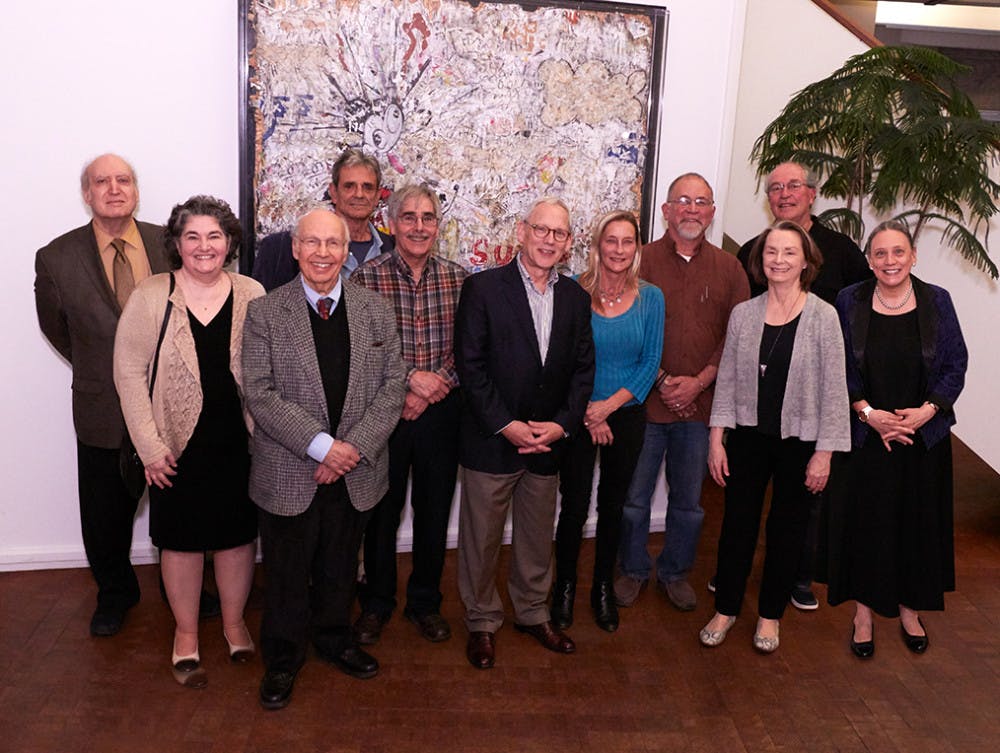Retiring Faculty
Over the next few years, Middlebury will see significant turnover in faculty and staff due to the college’s workforce planning initiative.
President Laurie L. Patton announced in June 2018 that the college would be offering its faculty elective, incentive-based retirement plans, often called “buyouts.” Currently, 24 professors have signed agreements to participate in the Faculty Retirement Incentive Program (FRIP).
FRIP is intended to save the college money because new tenure-track faculty can be paid lower salaries than professors who have held tenure for many years, as previously reported by the Campus. The FRIP package includes a year’s salary, funds for scholarship and research for up to three years after retirement, and establishment of a Health Reimbursement Account for health care.
This past May, the first round of FRIP participants were honored at a reception at the Mahaney Arts Center with other retiring faculty.
Professor of English and Liberal Arts John Bertolini decided to retire this year for health reasons and was happy to take the “generous offer” he received through FRIP. “I had been thinking I would go on associate status for a few years, but when the buy out became possible, I took the plunge,” Bertolini told the Campus last spring.
He began teaching at Middlebury in 1975 and was joined at the college by his wife, Mary Ellen Bertolini, in 1993. Bertolini expects changes in faculty to come with changes to the English and American Literature Department offerings, as the classes he taught disappear from the offered curriculum and new courses take their place.
Peter Hamlin, a professor of music, also retired last May. Hamlin said the incentive program was not a factor in his decision to retire, but that he did “get a small amount based on a formula [the college] used.”
Hamlin is looking forward to having more time in retirement to sail, swim, snowboard, cross-country ski, travel and learn Spanish with his wife.
Newly-Tenured Faculty
Keegan Callanan, assistant professor of political science, and Daniel F. Silva, assistant professor of Portuguese, were both offered tenure last May.
Silva described the experience of achieving tenure as both painful and joyful.
“I found myself mourning all who I left behind, because achieving ‘success,’ in academia or otherwise, while coming from communities like mine, often and sadly implies an involuntary divorce from home,” he said.
Silva will serve as interim director of the Center for the Comparative Study of Race and Ethnicity, while teaching International Global Studies 101 this fall.
“Through both capacities, I hope to continue finding a place here and working so that others of marginalized experiences may also find a place here,” he said.
Callanan is teaching two thematic courses this fall, one on problems at the intersection of religion and politics, and the other on the relationship between power and justice in international relations.
Tenure was developed in American universities to protect professors’ freedom of inquiry and speech, Callanan wrote in an email to the Campus.
“The intuition behind the practice is that the vocation of a scholar entails the pursuit of truth, and this pursuit should be undertaken without the risk of losing one’s livelihood as a consequence of reaching unpopular conclusions. Luckily, I hold no unpopular views, so tenure is a formality in my case.”
Callanan feels having tenure will positively impact his work as a professor.
“Tenure affords the scholar time — time to develop thoughts patiently, without being bound by short-term demands for results,” he said. “This enables a certain kind of intellectual risk-taking that would be rarer without tenure.”
The Board of Trustees also promoted nine associate professors to the rank of professor. Rebecca Bennette, one of the newly promoted instructors, explained this review occurs after five to eight years of associate professorship, and can mean a salary boost as well as eligibility for various positions and committees.
SOAN Split
Sociology and Anthropology, formerly one joint department, are now two separate departments, each with its own major offerings. This decision was made at the May faculty meeting, according to Dean of Curriculum Suzanne Gurland.
“Anthropology and sociology have always been different disciplines, but communicating that difference to students was always difficult in a joint department,” said Professor James Fitzsimmons, the chair of the new Anthropology Department.
As Fitzsimmons explained, both disciplines have diversified their offerings, they’ve grown increasingly separate, to the point where splitting made the most sense.
“Instead of being buried — yes, I’m an archaeologist, so pun intended — under joint departmental requirements, our anthropology students are going to be able to pursue a subfield or even sample them all,” Fitzsimmons said. He believes the split means his department will be able to diversify its curriculum, make study abroad easier and further develop subfields.
The separate departments will allow for “more disciplinary depth,” according to Linus Owens, Sociology Department chair. Owens added that Middlebury was the only one of its peer colleges in the Nescac league with a shared department and major before the switch.
Food Studies Minor
Faculty also voted to approve a new Food Studies minor at their May meeting.
The minor will include two introductory courses, a seminar course or independent study, and two courses selected from other disciplines including social sciences, health and humanities or natural sciences and geography, said Molly Anderson, academic director of the Food Studies Program. All minors will also participate in experiential learning.
Anderson sees the minor as “a way that students who are interested in food issues can dig deeper and get recognition for their work.”
Said Anderson, “Food Studies are important because food is connected with almost every discipline in one way or another. The ways that we produce, consume and waste food can either contribute to huge environmental and social problems or be part of the solutions.”
Faculty and curriculum changes for upcoming school year

COURTESY PHOTO
Retiring faculty gather at May celebration in Mahaney Arts Center.
Retiring faculty gather at May celebration in Mahaney Arts Center.
Comments



